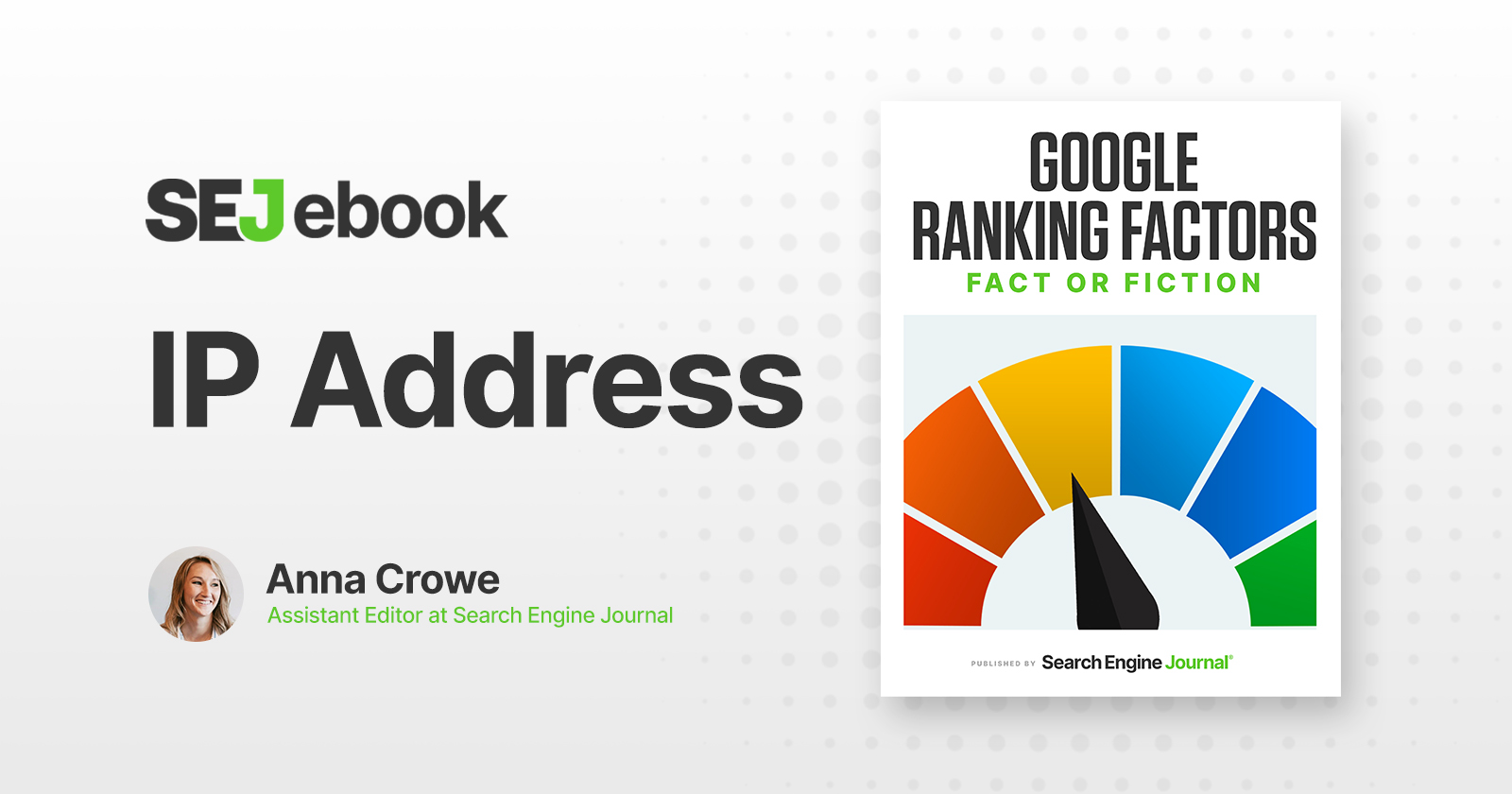Age-old stories and advice like the below from Brian Dean would have us believe that your server’s IP address will affect your rankings.
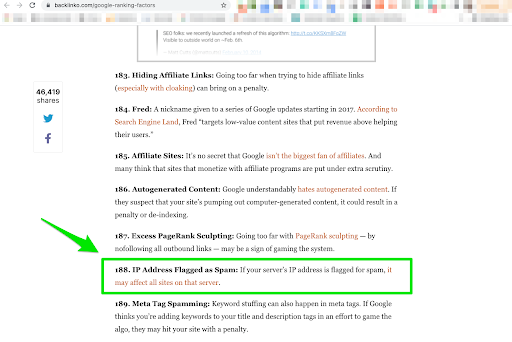 Screenshot by author, July 2021
Screenshot by author, July 2021I mean, why not? If your server is all porn, gambling, or Viagra, it would make sense to blacklist the server, right?
Advertisement
Continue Reading Below
But is it a myth?
One might imagine it wouldn’t be much help if Google blacklisted the server because SEO black hats could move their server. But it would become a constant game of Hungry Hungry Hippos.
That, and with evidence we’ll share below, is why SEO professionals are getting mixed messages here. Below, we discuss the truth behind IP addresses as a ranking factor.
The Claim: IP Address As A Ranking Factor
When it comes to IP addresses as a ranking factor, things can get cloudy in the SEO community. And it’s difficult to know who or what to believe.
Advertisement
Continue Reading Below
The idea of IP addresses as a ranking factor began with the term “bad neighborhoods.”
Bad neighborhoods are based on the idea that if you’re on shared hosting, your IP address is shared with all those other sites on the same shared server.
Essentially, this could mean you’re sharing a server with 5, 20, 100, 1,000, or even 20,000+ other websites.
If you share a server with 499 other websites talking about porn, does this impact your rankings?
Should you get a dedicated IP address? Or cloud hosting?
Let’s explore the evidence.
The Evidence Of IP Address As A Ranking Factor
Is IP Address A Ranking Factor?
Google’s Matt Cutts answered this IP address question back in 2003.
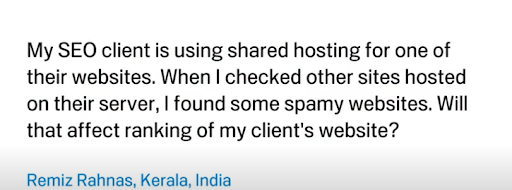 Screenshot by author, July 2021
Screenshot by author, July 2021His response:
“I really wouldn’t worry about it that much.”
But later in May 2011, Kaspar Szymanski, Google’s Search Quality Strategist, tweeted:
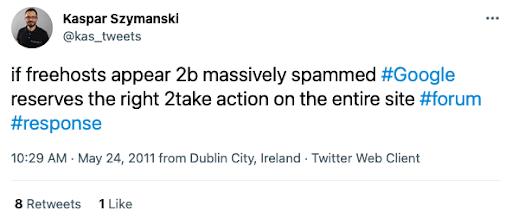 Screenshot by author, July 2021
Screenshot by author, July 2021As you can imagine, this raised some confusion in the SEO community. In June 2011, Google released a blog post about protecting users from malware hosted on bulk subdomain services.
Advertisement
Continue Reading Below
Then in July 2011, Google banned an entire subdomain, .co.cc, because the host had an unusual amount of spammy sites.
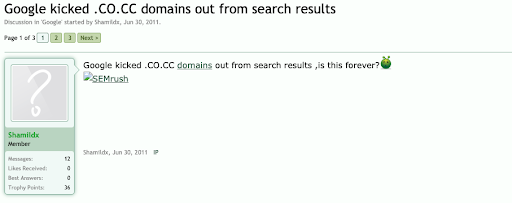 Screenshot by author, July 2021
Screenshot by author, July 2021Finally, in 2018, Google’s John Mueller laid this to rest when asked a similar question about IP addresses on Twitter.
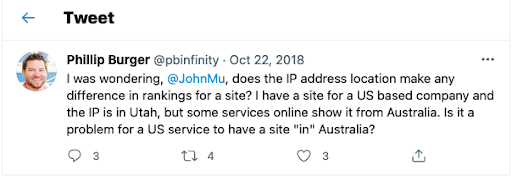 Screenshot by author, July 2021
Screenshot by author, July 2021Mueller’s response was simple and direct:
 Screenshot by author, July 2021
Screenshot by author, July 2021So, we can guess this was a potential ranking factor back in the early 2010s. But that’s not the case anymore.
Advertisement
Continue Reading Below
Does The Server Location Matter For SEO?
If you have your site hosted in the U.S. but move it to a server in Brazil, will that impact your SEO?
Mueller answered this question on Twitter, stating:
If you move to a server in a different location? Usually not. We get enough geotargeting information otherwise, e.g., from the TLD & geotargeting settings in Search Console.
Screenshot by author, July 2021
Do IP Addresses Affect Link Building?
Many SEO pros believe the server location and different C-Class IP addresses can improve ranking.
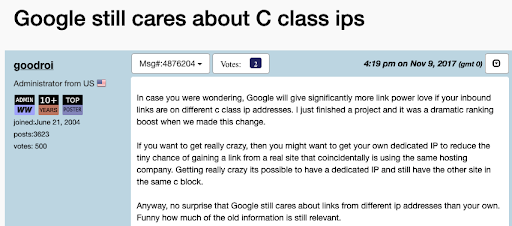 Screenshot by author, July 2021
Screenshot by author, July 2021Honestly, if you’re thinking about this in relation to your link building strategy, you aren’t doing link building right.
Advertisement
Continue Reading Below
Want proof?
Mueller answered this question in a Google Hangout with a simple “no.”
He added:
“That is not something where you need to artificially buy IP address blocks to just shuffle things around. And especially if you are on a CDN, then you will end up on an IP block with other companies as well. Or if you are on shared hosting then these things happen. That is not something that you need to artificially move around.”
Is A Shared IP, Dedicated IP, Or Cloud Hosting Better For SEO?
It does not matter if you have a shared IP, dedicated IP, or cloud hosting for SEO.
Advertisement
Continue Reading Below
Mueller answered this question related to dedicated IP and SEO on Twitter.
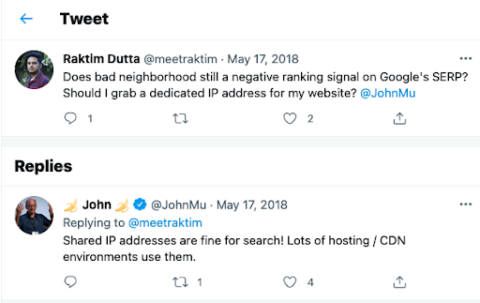 Screenshot by author, July 2021
Screenshot by author, July 2021IP Address As A Ranking Signal: Our Rating
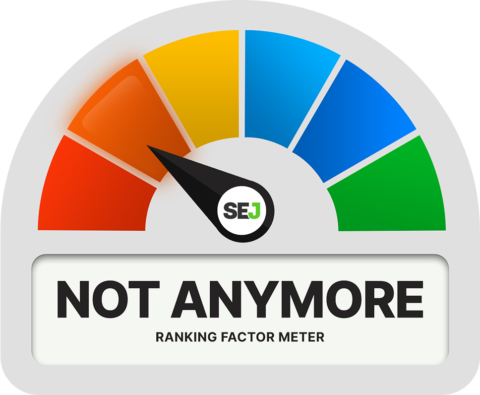
Your IP address does not impact your rankings, at least not anymore.
Advertisement
Continue Reading Below
The general consensus is that your time is better spent focusing on your website performance and content.
Featured image: Paulo Bobita
